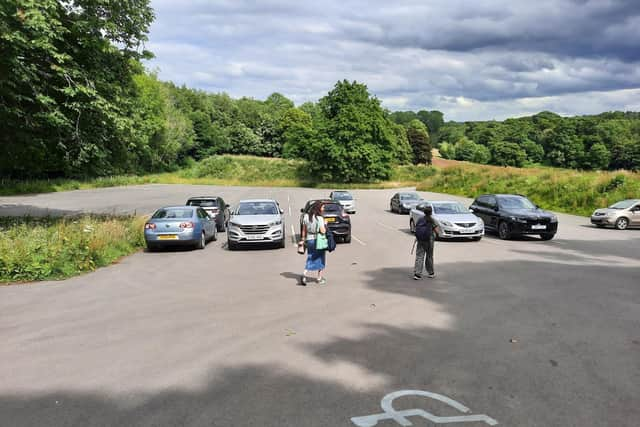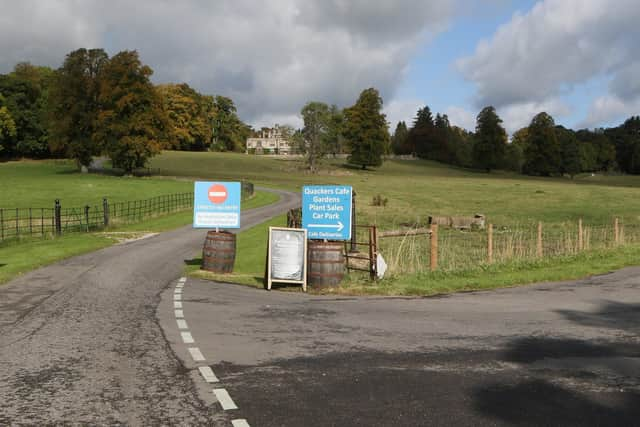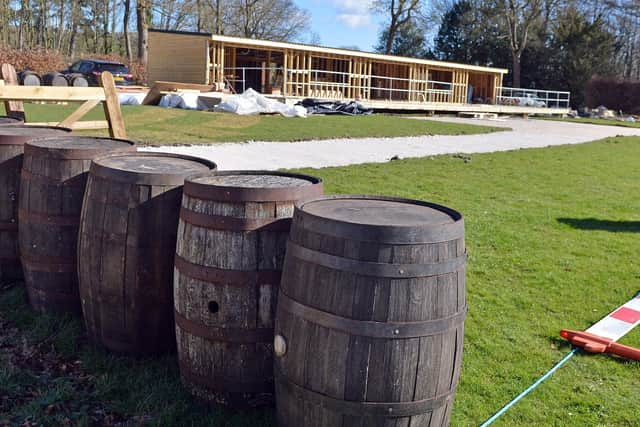Thornbridge Hall planning inquiry ends with arguments over harm and benefits - after further work carried out without permission on the Peak District estate
and live on Freeview channel 276
The visitor café, tarmac driveways, car park, earthworks and other additions were constructed during the pandemic by the owners of Thornbridge Hall, near Ashford in the Water, without approval from the Peak District National Park Authority (PDNPA).
The authority responded by ordering all the new features be demolished and the landscape returned to its original appearance – in keeping with the many legal heritage protections attached to the estate.
Advertisement
Hide AdAdvertisement
Hide AdThornbridge owners Jim and Emma Harrison appealed the decision, saying PDNPA’s planning department had been inaccessible during lockdown, and the case was ultimately referred to the national Planning Inspectorate for a final decision.


Most of the arguments for and against the development were heard over four days in October, but the fifth and final day of the inquiry was delayed until Thursday, December 8.
In her closing comments barrister Kate Olley, representing PDNPA, restated the central argument that the hall, gardens and parkland must be considered as a “holistic combination” with views – both on the estate and from neighbouring public land – that had been a noted feature since the 19th century and that Thornbridge was a “historic designed landscape of national importance.”
She added: “The visibly incongruous, modern and functional features were hastily and poorly constructed, challenging the original intent of tranquillity and beauty, and they do not represent good stewardship of the site.
Advertisement
Hide Ad“The unconsented works have created potentially permanent disruption to the experience of the park … Planning permission should no be granted, the development is clearly contrary to policy, as set out by witnesses.”
Advertisement
Hide Ad

The Harrisons, well known for their business associations with Thornbridge Brewery and the scandal-ridden government contractor A4e, have always argued that the developments were necessary to provide a sustainable, independent source of income to the estate which could fund costly conservation work while allowing greater public access to it than ever before.
Addressing, those concerns, Ms Olley said: “All the community benefits could be achieved without the development in its current form, and should not be given significant consideration over the heritage aspects.
“While third parties who spoke to the inquiry seem to be under the misapprehension that Thornbridge would have to be shut down, no such outcome is required by the enforcement notice.”
Advertisement
Hide AdResponding on behalf of the Harrisons, barrister Jonathan Easton stressed the public support for the development seen in submissions to the inquiry, and pointed out that Thornbridge Hall now employed 30 people, opened seven days a week and offered tours of the house, and has just been shortlisted for the Marketing Peak District and Derbyshire Tourism awards as ‘attraction of the year.’


He said: “Mr and Mrs Harrison accept entirely that they should have applied for permission but obviously the works were carried out with a desire to open their home to the public. It would be wholly inappropriate to ascribe any other motivation.
Advertisement
Hide Ad“There was a golden thread running through most of the supporting statements, and that was the effects on the mental health of visitors … Such compelling benefits would not have arisen without development.”He also contrasted PDNPA’s handling of the case with permissions granted to Chatsworth, a historic estate which has even higher levels of heritage protection, and pointed out that the authority had previously twice granted permission for a tennis court and associated structures on the site of the new café.
He added: “The authority’s witnesses significantly overplayed the value of these heritage assets … Evolution forms a key aspect of their interest, and the history of Thornbridge is one of evolution not stasis.
Advertisement
Hide Ad“The Harrisons should not be deprived of the same opportunities to provide heritage benefits, and Historic England did not take into account the proposed mitigation measures when giving their opinion on unmitigated, unbalanced harms.”


The day’s hearing had reopened with a further complaint from footpath inspector Ann Haden, who reported that despite the ongoing legal process, further works had been carried out on the estate.
She cited the replacement of stiles with metal gates and the removal of way-markers which had, in her view, again changed the estate’s character for the worse.
Advertisement
Hide AdDespite all the disagreements, the mood was more constructive as discussion moved on the conditions which inspector Deborah Boffin could choose to attach to her decision – whether she upholds the PDNPA enforcement order, or grants the Harrisons retrospective permission for the development.
Advertisement
Hide AdThe Harrisons hope their offer of remedial works will weigh in their favour. Proposals include modifying the driveways’ appearance driveway surfaces and car park layout, drainage systems, planting additional trees and producing a comprehensive conservation management plan for the estate as well as visitor management plans.
PDNPA representatives maintained that none of the proposed works would be sufficient to eliminate the harm done, and may even cause more.
Separate agreements between the two parties may be required later on some of the remedial proposals if permission is granted.


If the original decision is upheld, the authority hopes that all of the unauthorised development could be removed and the landscape reset within six months.
Advertisement
Hide AdAdvertisement
Hide AdMr Easton had argued that parts of the development could be allowed to operate for more than three years, to demonstrate the case for its public appeal.
Timescales to either reset the site to its original state or address some of the biggest causes of identified harm will be set out in the inspector’s conditions.
Ms Boffin will now take time to assess all the presented arguments and evidence and arrive at her final judgement, expected to be published sometime in early 2023.
For more details and documents related to the case, go to https://portal.peakdistrict.gov.uk/3279072.